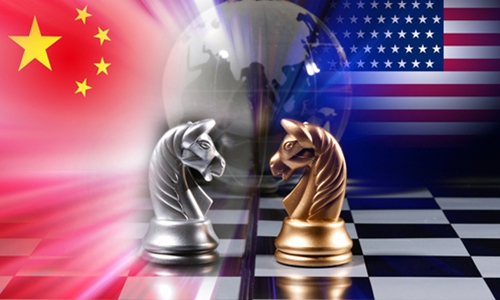Crude, dangerous and naïve of US trying to encircle China over HKSAR
Source:Global Times Published: 2020/5/30 17:03:40

Photo: GT
Editor's Note:
After days of threatening to take strong actions against China's planned national security legislation for Hong Kong, US President Donald Trump pulled the trigger early Saturday, Beijing time. Now the questions remain: Will Trump achieve his goal by imposing the latest sanctions against China? Is there any legal basis for the US actions? Is there any silver lining in the Beijing-Washington relationship? Global Times speaks to experts to elicit an answer.
Jeffrey Sachs, professor at Columbia University
Trump is trying to incite a new cold war against China. He believes that he can bring most of Europe and much of East Asia into a US-led confrontation with China. He also believes that US superiority in advanced semiconductors field will give the US the edge.
These ideas are very crude and dangerous. They are the product, in my view, of a disordered mind. They are naïve, in my opinion, about China's capacity to maintain friendly relations with most of the world despite the US provocations, and they are naïve as well about US technological superiority, since it will not take China very long to close certain gaps. China is at par with the US in other cutting-edge areas.
I hope that China responds to the US provocations with great patience and with a highly cooperative outreach to China's neighbors, to Europe, and to the rest of the world. We need global cooperation to end the COVID-19 epidemic and to address other critical challenges, especially climate change, pollution, and the destruction of marine and terrestrial habitats. China should be aiming to bolster regional cooperation, for example in the Regional Comprehensive Economic Partnership (ASEAN + China + Japan + Korea + Australia + New Zealand), as well as with the European Union and the African Union. This is especially important for human wellbeing and economic recovery at this time.
The US is gravely weakened by internal divisions, and those divisions are getting deeper. More than half of the US public disapproves of Trump but a little more than 40 percent approve of him, and many of those are his staunch supporters. American society is likely to remain deeply divided for years to come. This is one reason, probably the main reason, why the US has been incapable of a rational approach to contain the epidemic. Instead of working together to save lives, Trump is dividing Americans in order to retain power. It is very sad and tragic.
Zhang Tengjun, assistant research fellow at the China Institute of International Studies
Since violent riots erupted in Hong Kong in 2019, the US has been fermenting to adopt certain measures to meddle with the city. Relevant US moves have been frequent recently, thus the latest sanctions can be argued as unsurprising. Yet the moves will hardly create any major impact on the status of Hong Kong as a global financial center.
For long, Hong Kong has been playing the role as a financial center, which is widely recognized and irreplaceable. The city's comprehensive, mature financial system, as well as its foreign exchange reserves will help it withstand the current challenge posed by the US.
On the other hand, the relationship between Hong Kong and the Chinese mainland has not fundamentally changed, and it is even more unlikely that US actions would be able to change the status quo. Most foreign companies, especially US enterprises, still believe that Hong Kong serves as a financial center and a vital link between them and the Chinese mainland.
Moreover, Hong Kong has been an important center for intermediary trade in the region, and most of its business is re-exporting goods from the Chinese mainland; very few products in its trade with the US are manufactured in Hong Kong. Therefore, the US raising tariffs on imports from Hong Kong will hardly affect the city's economic development.
On Wednesday, US Secretary of State Mike Pompeo said, "The State Department is required by the Hong Kong Policy Act to assess the autonomy of the territory from China." He went on to say, "Hong Kong does not continue to warrant treatment under US laws in the same manner as US laws were applied to Hong Kong before July 1997. No reasonable person can assert today that Hong Kong maintains a high degree of autonomy." The Hong Kong Policy Act refers to the United States-Hong Kong Policy Act of 1992, which is a US domestic law propagated to intervene in other country's internal affairs. In other words, the US sanctions on China are actually carried out without any recognized legal basis.
The latest round of sanctions over Hong Kong is one of a series of issues in deteriorating China-US ties. The US hopes to use the Hong Kong card to jeopardize China's financial stability and cause a big blow to China. Further decay of Beijing-Washington relations is inevitable. So far, there is no sign of any possible improvement. Future cooperation is becoming almost impossible while the current collaboration will be increasingly confronted with obstacles.
In the face of Trump's bullying and gross interference in China's domestic affairs, it is necessary for China to respond with firm countermeasures. More importantly, China must safeguard the interests of Hong Kong people, and prevent US sanctions from damaging the wellbeing of Hong Kong people. The Chinese mainland got Hong Kong's back firmly and will relentlessly resist any possible challenges ahead.
RELATED ARTICLES:
Posted in: VIEWPOINT